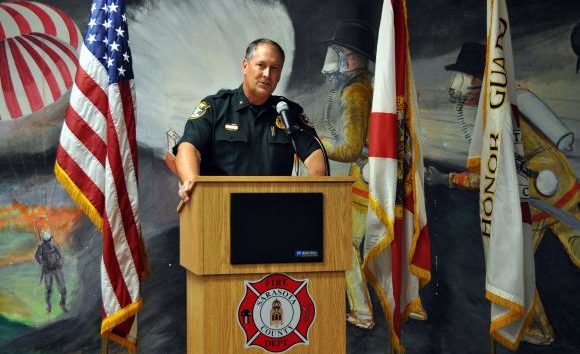Florida Sheriff: Medical Marijuana Amendment a very bad idea
Sarasota County Sheriff Tom Knight did an op-ed in the Herald-Tribune on the Florida Right to Medical Marijuana Initiative, Amendment 2. Sheriff Tom Knight is the 10th Sheriff of Sarasota County, serving since January 6, 2009. To pursue this office, he left a 20 year career with the Florida Highway Patrol where he held the position of Troop Commander, managing a seven-county region with more than 300 employees, a central communications center and a $20 million budget.
According to Ballotpedia:
The Florida Right to Medical Marijuana Initiative, Amendment 2 is on the November 4, 2014 ballot in the state of Florida as an initiated constitutional amendment. The measure, upon voter approval, would legalize the cultivation, purchase, possession and use of marijuana to treat medical conditions when recommended by a licensed physician. The measure would also order the Florida Department of Health to register and regulate producers and distributions of medical marijuana and to issue identification cards to patients and caregivers utilizing marijuana.
The measure is sponsored by the People United for Medical Marijuana.
Sheriff Knight makes the following points in the Herald-Tribune op-ed:
- There is overwhelming factual information pointing to the darker side of legalized marijuana, even when it is intended strictly for medical therapy. Messages in the $4 million-plus campaign to get this issue passed have tugged on our emotions and focused on isolated cases, without a thought or mention of the many negative, unintended consequences that are already playing out in other states that have legalized medical marijuana — even those whose ballot amendment language was far more restrictive than what is proposed in Florida.
- Although many voters may think that medical marijuana will truly be limited to those with chronic, life-threatening conditions or severe, unmanageable pain, we must not delude ourselves into thinking that this will be our reality if it passes. Keep in mind that it will not be treated like real medicines — the kinds that are scientifically tested through clinical trials and regulated by the Food and Drug Administration. Instead, it will be more like a homeopathic substance, sold not by pharmacists but marijuana retailers.
- In Colorado, where nearly 107,000 patients have approval for medical marijuana, the average user is a male in his 30s with no terminal illness and a history of drug abuse. Only 2 percent of Colorado medical marijuana patients report being treated for cancer, less than 1 percent report treatment for HIV/AIDS, and only 1 percent report treatment for glaucoma. The statistics from other states that permit medical marijuana show similarities.
- What we will likely (almost certainly) see is a proliferation of marijuana dispensaries in our communities, because the profit potential here is enormous. Census data suggests that communities with populations comparable to Sarasota’s in states that permit medical marijuana have already experienced this. To evaluate this for yourself, visit www.weedmaps.com. Thus, Venice, Florida, could mirror Venice, California, where marijuana dispensaries are a common sight along the famous beach.
- Because federal law makes marijuana illegal, corresponding banking and credit card restrictions make medical marijuana a largely cash business. As with any cash business involving a commodity that people crave, the infiltration of organized crime has followed. In November 2013, the Drug Enforcement Administration raided several Colorado marijuana dispensaries based on suspected ties to Colombian drug cartels. Given that Florida has almost four times the population of Colorado, this trend will easily migrate here.
Read the full op-ed by going here.
Recently Dr. Larry Reed was in Sarasota to discuss seven principles of sound public policy. In the context of the medical marijuana debate principle number three comes to mind:
Sound policy requires that we consider long-run effects and all people, not simply short-run effects and a few people.
Sheriff Knight is considering the long-run effects and all the people.
RELATED STORIES:
Students Find Way To Secretly Smoke Marijuana In Class – CBS Denver
Pocket hookahs proliferate with young marijuana users, sources say – The Denver Post
LA Times – Pot candy ‘geared toward children’ seized at San Clemente checkpoint
EDITORS NOTE: The featured image is attributed to Rachel S. O’Hara, Staff Photographer for YourObserver.com.


